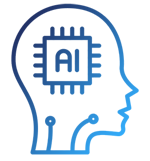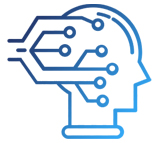- AI

Artificial Intelligence

Smart Products & Services
We follow Smart Products & Services

Intelligent Business Functions & Processes
We follow Intelligent Business Functions & Processes

Robotic Process Automation
We follow Robotic Process Automation

Personalized
healthcareWe follow Personalized healthcare

Identifying at-risk patients
We follow Identifying at-risk patients

Optimized routing and scheduling
We follow Optimized routing and scheduling
- ML

Machine Learning

Predictive
AnalyticsWe follow Predictive Analytics

Service Personalization
We follow Service Personalization

NLP
We follow NLP (Natural Language Processing)

Stock Market Forecasting
We follow Stock Market Forecasting

Fraud Prevention
We follow Fraud Prevention

Recommender engines
We follow Recommender engines
- blockchain
- IOT

Internet of Things
- AR
- Business Solutions

Business Solution

Business Performance Management
We follow Business Performance Management

Decision Making & Big Data Analytics
We follow Decision Making & Big Data Analytics

Enterprise Data Management
We follow Enterprise Data Management
- Apps

Apps

Native Apps
We follow Native Apps

Cross Platform Apps
We follow Cross Platform Apps

Web Apps
We follow Web Apps

Hybrid Apps
We follow Hybrid Apps

Cloud Native Apps
We follow Cloud Native Apps
- Lab

Learn That Why Web 3.0 Is Significant In The Coming Years
At the moment, the next-level revolution of the internet is in the process that targets to make users have more control over web content. Web 3.0 will indeed be doing wonders for every Blockchain technology company as, at its core, it is built on the same concept. It concerns technology that deals with bitcoin and other multiple cryptocurrencies with the aim of eliminating intermediaries that also include government bodies and repositories.
To explain in simple words, Web 3.0 will not require the users to create different accounts for every social platform. If you have only one account, you can browse and move between various social platforms and the internet to have what you need.
Understanding What The First Phase Or Web 1.0 Was?

Web 1.0 was started back in the 1990s. It was when the dot-com boom empowered the ease of access for the information users needed. Due to largely unorganised data, the navigating was complex. Things stayed like this since Google and MSN put an end to the chaos when they introduced Web 2.0 at the end of the 1990s. When the information was adequately sorted, it became organised and easily accessed. Furthermore, this assisted so much in ranking search results according to popularity. Gradually this led to a shift of power to a few giant corporations.
On the other hand, Web 3.0 is proposed by the content creators who desire to get reassuming power back. This will allow access to the internet to new search engines and social media platforms with complete content control.
Major Changes In Web 3.0 From Web 1.0
Web 1.0

The number of content creators when the internet offered information, in the beginning, was very few. On the other hand, the number of content seekers was in the majority, making up the giant chunk of all users on the internet. The content was primarily available in the form of static web pages and web servers by Internet Service Providers (ISPs). It is safer to say that Web 1.0 was nothing more than a content delivery network.
As users used to view the content on the internet, they were charged for every view they had. The online directories directed the content seekers to the information they were looking for.
Web 2.0

As soon as more content creators started to come online, the websites were seen to have more user-generated content. This led to an increase in the focus on the content’s usability. Websites became more engaging, and the content seekers were enabled to communicate to the content creators through the comments section on web pages.
Content took a dynamic turn when it was modified according to users’ feedback. The communication between the content creators and seekers made the flow of information more accessible.
Enhancements that came with Web 2.0;
- Podcasts
- Social Networking
- Blogs
- Tagging on various platforms
- Social Media Platforms
- The Voting on web content by users
The perspective that users had made a huge difference in the expansion of the internet. Be it a blockchain technology company providing top-notch blockchain solutions to its users.
Web 3.0 Is Still In The Developing Phase

Web 2.0 indeed worked on improving communication and online interaction. Whereas web 3.0 entirely focuses on connectivity, content outreach, performance, and content relevance. Decades of work was done to improve the website look and the back-end’s functionality. The result was always to maximise the user experience. We see Web 3.0 dive deep into a surfeit of aspects.
This third generation of the web will be collecting information of the users they convey on the website through text, voice, or any form of known media. This information is processed intelligently to tailor the content for users. By doing this, the data will become a shared resource, excluding the possibility of being owned by any single party.
What Is The Connection Between Cryptocurrencies And Web 3.0?

Precisely, like blockchain solutions technology, Web 3.0 is striving to make a version of the internet that is more democratic. This can be done by incorporating the decentralised applications (dApps) in the ecosystem and leading the crypto players to have smart contract capabilities of blockchain. DApps are the applications that operate on blockchain’s network of computers rather to depend on a single computer. This will be contributing to automating processes for a more democratic internet.
Various reports have suggested that ethereum can be the most popular Web 3.0 blockchain as it helps a lot to the dApps developers. This will be bringing more focus on ether. Other projects of crypto are already improving the experience for Web 3.0, such as Kusama, Polkadot, and Helium.
Furthermore, Web 3.0 will also be blending well with metaverse to make the buying and selling of non-fungible tokens (NFTs). Also, non-fungible tokens portray your ownership of any virtual good that can be sold or bought. This is one of the quickest growing trends in the market, and many people are pretty interested in that.
Artificial Intelligence Blending Well With Web 3.0

With the innovation that Web 3.0 aims to bring, the rich use of Artificial Intelligence will be seen. The information will be well understood by the computers like humans using technologies like semantic web concepts and natural language processing. The use of machine learning will use data and algorithms to mimic the ways humans learn things so that the accuracy can be improved. This way, computers will be able to produce faster and much relevant results.
- Connectivity And Ubiquity

The content and information are much more connected and ubiquitous; means access to multiple applications increases rapidly. The ease of getting the data from the internet is what the prominent focus people have now. This is what Web 3.0 will be working for and drive great results in the near future.
Conclusion
The constant advancements and improvements for the internet have been the primary focus over the years. What Web 3.0 has in stock for the world will greatly benefit and enhance how things are done today. The big data services providers, blockchain technologies, and Artificial Intelligence solutions will enhance the user experience more than ever.
Also Read: 6 Technology Trends Every Business Must Follow In 2022



















































Leave a Reply